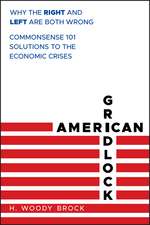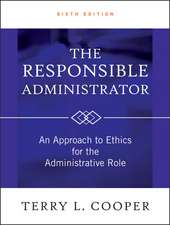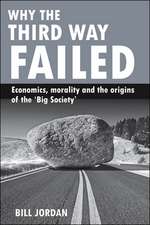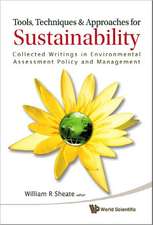Economic Liberties and the Constitution
Autor Bernard H. Sieganen Limba Engleză Paperback – 9 ian 2005
Siegan brings the argument originally advanced in the .first edition completely up to date. He explores the moral position behind capitalism and discusses why former communist countries flirting with decentralization and a free market (for instance, China, Cambodia, Vietnam, and Laos) have become more progressive and prosperous as a result. He contrasts the benefits of a free, deregulated economy with the dangers of over-regulation and moves towards socialized welfare—most specifically as happened during Franklin Roosevelt's presidency. Supporting his thesis with historical court cases, Siegan discusses the past and present status of economic liberties under the Constitution, clarifies constitutional interpretation and due process, and suggests ways of safeguarding economic liberties.
About the original edition, Doug Bandow of Reason noted, "Siegan has written a vitally important book that is sure to ignite an impassioned legal and philosophical debate. The reason—the necessity—for protecting economic liberty is no less than that guaranteeing political and civil liberty." Joseph Sobran of the National Review wrote, "Siegan...makes a powerful general case for economic liberty, on both historical and more strictly empirical grounds.... Siegan has done a brilliant piece of work, not only where it was badly needed, but where the need had hardly been recognized until he addressed it." And Edwin Meese remarked that, "This timely and important book shows how far we have drifted from protecting basic liberties that the Framers of the Constitution sought to secure. I recommend it highly." This new, completely revised edition of Economic Liberties and the Constitution will be essential reading for students of economics, history, public policy, law, and political science.
| Toate formatele și edițiile | Preț | Express |
|---|---|---|
| Paperback (1) | 442.89 lei 6-8 săpt. | |
| Taylor & Francis – 9 ian 2005 | 442.89 lei 6-8 săpt. | |
| Hardback (1) | 1009.74 lei 6-8 săpt. | |
| Taylor & Francis – 22 sep 2017 | 1009.74 lei 6-8 săpt. |
Preț: 442.89 lei
Nou
Puncte Express: 664
Preț estimativ în valută:
84.75€ • 87.43$ • 70.72£
84.75€ • 87.43$ • 70.72£
Carte tipărită la comandă
Livrare economică 27 martie-10 aprilie
Preluare comenzi: 021 569.72.76
Specificații
ISBN-13: 9781412805254
ISBN-10: 1412805252
Pagini: 434
Ilustrații: 1
Dimensiuni: 152 x 229 x 25 mm
Greutate: 0.61 kg
Ediția:Revised
Editura: Taylor & Francis
Colecția Routledge
Locul publicării:Oxford, United Kingdom
ISBN-10: 1412805252
Pagini: 434
Ilustrații: 1
Dimensiuni: 152 x 229 x 25 mm
Greutate: 0.61 kg
Ediția:Revised
Editura: Taylor & Francis
Colecția Routledge
Locul publicării:Oxford, United Kingdom
Cuprins
1: The Magna Carta; 2: Protection of Material Rights Prior to the Ratification of the Constitution; 3: Framing a Constitution to Secure Liberty; 4: Judicial Interpretations of Due Process Prior to the Framing of the Fourteenth Amendment; 5: Substantive Due Process Decisions 1905–1937: Lochner v. New York (1905) Comment by Professor Christopher Wonnell West Coast Hotel Co. v. Parrish et al . (1937) Nebbia v. New York (1934) New State Ice Co. v. Liebmann (1932); 6: Destroying the Original Constitution; 7: The New Deal Justices Reinterpret the Constitution; 8: U.S. Supreme Court Refuses to Reverse Economic Liberties Decisions and Strikes Down Commerce Clause Decisions; 9: Failures of Statism in the United States and its Collapse Elsewhere in the World; 10: Economic Success: Germany (Come and Gone), Ireland, China, and Vietnam; 11: Recent Decisions That Do Not Apply Due Process or Equal Protection to Protect Economic Liberties: Dolan v. City Of Tigard (1994) BMW of North America, Inc. v. Gore (1996) Allied Structural Steel Co. v. Spannaus (1978) C & A Carbone, Inc. v. Town of Clarkstown (1994) 44 Liquormart, Inc. et al. v. Rhode Island et al . (1996); 12: Some Lower Courts Strike Down Economic Legislation, but Supreme Court Changes Uncertain; Epilogue
Descriere
In this seminal work, Bernard Siegan traces the history of onstitutional protection for economic liberties in the United States











